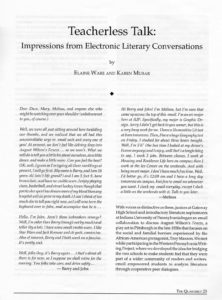Author: Elaine Ware and Karen Murar
Summary: When high school teacher Karen Murar and college instructor Elaine Ware, teacher-consultants with the Western Pennsylvania Writing Project, discovered students were scheduled to read the August Wilson play Fences at the same time, they set up email communication between students to allow some “teacherless talk” about the text. The experiment yielded powerful student-led conversations, making use of reading strategies such as predicting, interpreting, and connecting. Though written in the early days of email, this article still contains useful lessons and insights for facilitating student discussion in online environments.
Original Date of Publication: Summer 1998
Excerpt
Students’ freedom to choose their topics for discussion led to rather fluent and creative interpretations of Wilson’s characters, symbols, and theme rather than the sometimes mechanical and stilted literary analysis students produce in formal papers. Whereas students in the traditional classroom feel the need to prove that they have read the selection and understand the terminology by regaling the teacher with plot summaries and technical definitions, email frees them to share their interpretations and naturally apply literary terms as they communicate.
Related Resources
- The Relationship of High School Student Motivation and Comments in Online Discussion Forums
- Immigrant Teens in the South Bronx Learn the Art of Online Discussion
- Literacy in the Digital Age: Nine Great Speaking and Listening Tools
Original Source: National Writing Project, https://archive.nwp.org/cs/public/print/resource/quarterly/1998no3/murar.html
